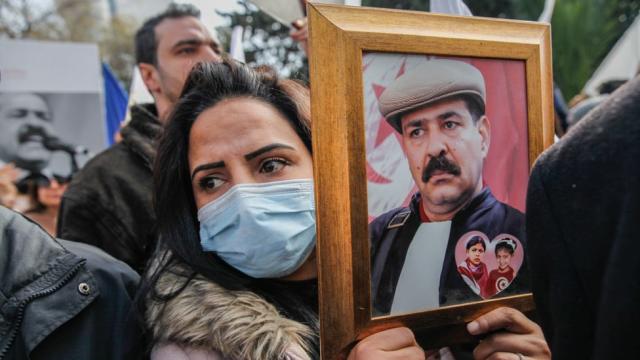
Four people were sentenced Wednesday to death and two to life in prison for a murder that sparked widespread unrest in Tunisia and became emblematic of the country’s early challenges transitioning from dictatorship to democracy after the Arab Spring
Chokri Belaid, the 48-year-old leader of the Popular Front coalition, was a prominent critic of the Islamist Party Ennahda that ascended to power after 2011 uprisings toppled the country’s longtime dictator.
His assassination was among a spate of violent episodes that provoked protests in 2013 and became emblematic of Tunisia’s early struggles to reconcile its celebrated secular traditions with the revival of long suppressed religious ultraconservatives.A criminal court tasked with handling terrorism cases handed down 23 sentences for Belaid’s murder.
The sentences, in addition to the death penalties and life sentences, ranged in length from two to 120 years, a public prosecutor said outside of the court.Belaid’s brother Abdelmajid Belaid called the sentences “a positive step” and said that supporters were still awaiting the trial of those suspected of planning the assassination.Belaid’s case was reopened last month after a former investigating judge was arrested on suspicion of concealing certain files.
Wednesday’s sentencing came after hours of late night delays and lengthy deliberations due to “the complexity of the very thorny case,” said Mohamed Jmour, a member of Belaid’s defense committee.
Before his death, Belaid had earned a following for his forceful denunciations of Ennahda, which rose to power after President Zine El Abidine Ben Ali was toppled in 2011. Belaid’s supporters blamed Islamists for taking an overly accommodating approach toward extremists after his assassination and later decried the slow pace of the investigation. Ennahda leaders subsequently took a harder line against fundamentalists and classified Ansar al Sharia as a terrorist group when another left-wing politician, Mohammed Brahmi, was slain later that year.
Law enforcement killed several alleged members of the al-Qaida-linked group suspected of involvement in Belaid’s death. Several members of Ansar al Sharia were among those sentenced for Belaid’s murder on Wednesday. The assassinations and subsequent unrest set off a political crisis for Tunisia as it struggled to transition from dictatorship to democracy.
The country teetered on the brink until a Nobel Prize-winning quartet of civil society groups negotiated with various parties to prevent the nascent government’s institutions from unraveling. Though bringing the killers to justice has been a rallying cry for President Kais Saied, authorities during his tenure have quashed protests by Belaid’s supporters, including on the 2021 anniversary of his assassination.
Two dozen defendants were ultimately charged in a sprawling case that took years to investigate and bring to trial. One died in prison. Of the 23 defendants sentenced on Wednesday, five were acquitted.Aymen Chtiba, a deputy prosecutor in the terrorism court’s judicial unit, said the dismissals had to do with the similarity of sentences already handed down against some defendants in other cases.Tunisia has not put anyone to death since 1991 though Saied has publicly said he supports reviving executions for certain crimes, including murder.

